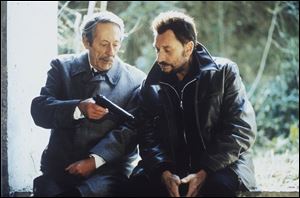
Movie review: Man on the Train ***
7/25/2003
Jean Rochefort and Johnny Hallyday in Man on the Train.
Man on the Train is the sort of movie I feel I ought to like more than I do. The premise is fascinating, but the pace is so slow and ponderous, the film could be used as a soporific.
Then again, maybe I don't have enough taste to appreciate great works of art. I don't think Man on the Train is one, but it's the sort of movie that promotes second-guessing. (By the way, it's in French with English subtitles, which are workmanlike but not terribly creative, so maybe I was missing something.)
It stars Jean Rochefort as Manesquier, a retired teacher of poetry in a small French town. It doesn't matter where, it doesn't matter when. A bachelor, he lives in a home much too grand for a retired teacher, until you look closer. The wallpaper is peeling; there is a feeling that nothing has been moved - or dusted - for half a century. It is the home of his late parents. Manesquier, it seems, has never left, has never seen anything beyond his small corner of the world.
Riding a train into this town is Milan, played by French rock and roll legend Johnny Hallyday. Wearing fringed leather and carrying a battered duffel, Milan looks world-weary. His tired eyes seem to indicate he's seen everything, been more places than he can count.
The men meet in an apothecary, where Milan has gone for aspirin. I live nearby, Manesquier says. May I offer you a glass of water?
They chat, then Milan leaves. But it is not long before he returns. The hotel is closed, he tells Manesquier, who replies with a small smile, “I know. Let me show you to your room.”
There's more to Manesquier, apparently, than it first seemed.
Milan unpacks. In the dresser, he carefully places three handguns, then covers them with his clothes. He, at least, is living up to expectations.
Over the next few days, the men form an unlikely friendship. Manesquier figures out that Milan is a bank robber, but it doesn't bother him. In fact, Manesquier says he wishes he could help, and his sincerity is obvious.
What is also obvious is that as they talk about everything and nothing - sex, poetry, women, food - each man yearns for the other's life. In Milan, Manesquier sees action and adventure and a mind unburdened by obscure passages of poetry. In Manesquier, Milan sees stability, education, and tranquility.
There is a scene in which Manesquier takes Milan to a bistro he has frequented for 40 years. Two young men are arguing, and one bumps into Milan, who does nothing. At Manesquier's look of curiosity, Milan explains, “There are two of them and I'm getting old. At one time they would have apologized.” Outraged for his friend, or perhaps emboldened by him, Manesquier gets up and goes to tell off the rowdies.
One might expect him to face rudeness or laughter. Instead, he gets respect. One of the rowdies is a former student of Manesquier, one who learned a love of poetry from him. Manesquier is embarrassed; he wanted action. Milan is quietly impressed.
That scene is one of the unexpected pleasures of Man on the Train, written by Claude Klotz and directed by Patrice Leconte, who also directed the character-driven The Widow of St. Pierre, which played in Toledo only briefly.
Perhaps such scenes are unexpected because movie audiences have grown immune to the ordinary ebb and flow of life. In an American movie, the rowdies would have pushed Manesquier around, and Milan would have come to his rescue. In an American movie, the spontaneous friendship between Manesquier and Milan would have had ulterior motives. In Man on the Train, that friendship simply develops and exists.
In an American movie, all this would have taken place in about five minutes. Here it's about an hour into the film, which may be the movie's major problem. To put it kindly, Leconte's pace is deliberate. All that conversation, which seems to be leading nowhere, is yawn-inducing; 90 minutes never seemed so long.
The movie's ending, which I quite enjoyed (and not just because the movie was finally over), is open to interpretation. Was it a dream or did it happen? Leconte lets us decide.
If we can stay awake, that is.